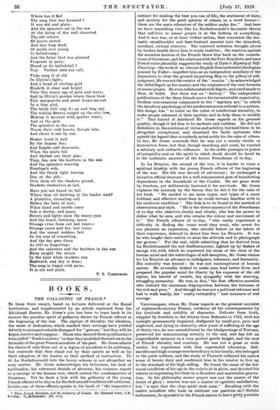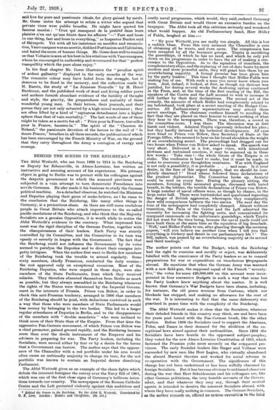BOOKS.
THE GALLANTRY OF FRANCE.*
1w these three essay's, based on lectures delivered at the Royal Institution, and supplemented by an article reprinted from the Edinburgh Review, Mr. Gosse's aim has been to trace back to its sources the peculiar spirit of gallantry shown by French officers at the beginning of the war. The rapture of chivalry, the idealism, the sense of dedication, which marked their writings have yielded latterly to animperturbable disregard for "gesture," but they will, he hopes, survive and reappear. Those who showed these qualities have been called" Traditionalists," in that they modelled themselves on the formulae of the great French moralists of the past. Mr. Gosse admits his choice of only three out of a legion of moralists to be arbitrary, but contends that they stand out by their merits as well as by their adoption of the maxim as their method of instruction. To fit La RochefoucauM into the heroic scheme is not altogether an easy matter. Mr. Gosse acknowledges his bitterness, his lack of spirituality, his vehement denials of altruism, his common repute AS a scourge of the human race, which earned the condemnation of Rousseau. Yet he finds a link with the gallantry of the young French officers of to-day in La Rochefoucauld's ruthlessself
Lintier, one of these officers, speaks in his book of "the imperative
• Three French Moratiste, and the Gallantry of Fumes. By Edmund Goss; O.B. tendon ; livtaetartun, net,I instinct for making the best you can of life„, the sentiment of duty, and anxiety for the good opinion of others, in a word honour— these are the main educators of the soldier under fire." And here we have something' verylike La Rochefoucauld's favourite theory that self-love or amour propre is at the bottom of everything., And it was war, or at least violent action, that converted the fan- tastic swashbuckler and hire-brained amorist into the detached, mordant, critical observer. The enforced seclusion brought about by broken health drove him to study realities ; the reaction against the senseless horrors Of the Fronde threw him back on the consola- tions of literature, and his relations with the Port-Royalists, and (sea French critic plausibly suggests) the study of Dyke's Mystery of Self- Deceiving—the work of an obscure English Nonconformisttheologian praised by Fuller—impelled him, as an independent auxiliary of the Jansenists, to clear the ground by putting Man in the pillory of self- judgment. He was not the creator of the " maxim " ; he acknowledged the Abbe Esprit as his master, and the originator of the root formula of anwur propre. He even collaborated with Esprit, and owed much to Mme. de Sable. But there was no "factory." The independent publications of the three friends prove his incontestable superiority. Endless conversations culminated in his "lapidary art," in which
• the desultory psychology of his predecessors was reduced to a system. His design was "to insist on the value of intellectual sincerity, to make people ashamed of their egotism and so help them to modify it." This hatred of falsehood Mr. Gosse regards as his greatest quality, though it led him to be sardonic and ruthless. He did not disbelieve in the existence of virtue and nobility, but held them to be altogether exceptional, and chastised the facile optimists who upheld the legend that everybody acted nobly for the sake of others. In fine, Mr. Gosse contends that he was not a merely sterile or destructive force, but that, though searching and cruel, he exerted a salutary and cathartic influence. In the noble passages in praise of intrepidity and on the spirit in which death should be faced he is the authentic ancestor of the heroic Frenchmen of to-day.
In La Bruyere, the second of the trio, it is harder to trace a spiritual kinship with the young French officers of the beginning of the war. His life was devoid of adventure ; he exchanged a lucrative official sinecure for a well-remunerated post of humiliating dependence in the household of the Condes. He set great store by freedom, yet deliberately bartered it for servitude. Mr. Gosse explains the anomaly by the theory that he did it for the sake of his book. "He needed to see more typos, and types of a more brilliant and effective kind than he could become familiar with in his mediocre condition." The link is to be found in his method of observation and style. "He is the direct ancestor of the Frenchman of to-day who observes closely and clearly, who has the power to define what he sees, and who retains the colour and movement of it." The French officers of to-day, "who rarely experience a difficulty in finding the exact word they want, who arrest for our pleasure an impression, who rebuild before us the fabric of their experience, descend in direct line from La Bruyere. It was he who taught their nation to seize the attitude and to photograph the gesture." For the rest, while admitting that he derived from La Rochefoucauld the sad disillusionment, lighted up by flashes of savage wit, with which he expressed his sense of the vices of the human mind and the subterfuges of self-deception, Mr. Gosse claims for La Bruyere an advance in indulgence, tolerance, and humanity. His curiosity was lenient : he was not contemptuous of human nature. He avowedly wished to make men lead better lives, and prepared the popular mind for liberty by his exposure of the old regime, his hatred of wealth, his sympathy with the starving, struggling peasantry. He was, in fine," the first effective moralist who realized the enormous disproportion between the fortunes of the rich and poor." And though he was not a political reformer and had to walk warily, his "crafty intrepidity" had moments of real courage.
Vauvenargues, whom Mr. Gosse regards as the greatest moralist, of eighteenth-century France, outshone all his contemporaries by his fortitude and nobility of character. Delicate from birth, crippled by frostbite in the retreat from Bohemia in 1742, with his eyesight permanently impaired, disfigured by small-pox, poor and neglected, and dying in obscurity after years of suffering at the age of thirty-two, he was unembittered by the bludgeonings of Fortune, preserved his unmurmuring serenity to the end, and has left an imperishable memory as a very perfect gentle knight, and the soul of French chivalry and courtesy. He was not a great or wide reader, but experience with him superseded education. Self- sacrifice and high courage were hereditary in his family, who belonged to the petite noblesse, and the study of Plutarch inflamed his native sense of heroic duty and confirmed him in his resolve to live up to the standard of his high calling. He found the cause of the low moral condition of his age in the ntiprtio de in gloire, and devoted his talents to impressing his ideal on a decadent and materialist genera- tion. In his philosophy amour propre was not the source of the desire of glory ; renown was not a matter of egotistic satisfaction, but "a spur that the clear spirit doth raise." Breaking with the earlier moralists who bade us mistrust our passions an1 disdain enthusiasm, he appealed to the French nation to leave petty pursuits
and live for pure and "passionate ideals, for glory gained by merit. Mr. (base notes his attempt to refute a writer who argued that private vices were public benefits. He might have quoted his famous maxim: " Ceux qui raanquent de la prebite dans leurs plaisirs n'en ont qu'ime feinte dens lee affaires "—" Fast and loose lone thing, fast and loose in everything," as Inspector Bucket said of Skimpole. Yet with all his insistence on sacrifice end renuncia- tion, Vauvenargues was no ascetie, disli ked Puritanism and Calvinism, and hated the scorn of human things. Mr. Goose does well to remind us that Voltaire is seen at his best in his relations with Vauvenargues, whom he encouraged in authorship and reverenced for that" perfect tranquillity which the pure alone enjoy."
In his final chapter Mr. Gosse illustrates the "peculiar spirit of ardent gallantry" displayed in the early months of the war. The romantic colour may have faded from the struggle, but it deserves to be fixed in the memory, and the collection made by M. Banes, the study of "La Jeunesse Nouvelle" by M. Henri Bordeaux, and the published work of dead and living soldier poets and authors furnish abundant evidence of the lucidity of thought and style, the gravity, the preparedness and maturity of these wonderful young men. In their letters, their journals, and their poems they are not only actuated by a high Moral sentiment ; they are often lifted by a kind of "rapturous detachment into a higher sphere than that of vain mortality." The last words of one of them might be taken as a motto for all : " Priez pour la France, travaillez pour la France, haussez-la." The spirit of the "Chanson de Roland," the passionate devotion of the heroes to the soil of " la donee France," breathes in all these records, the publication of which has been encouraged by the French Ministry of War, on the ground that they carry throughout the Army a contagion of energy and courage.



































 Previous page
Previous page